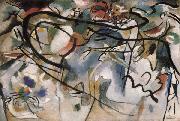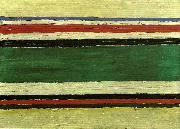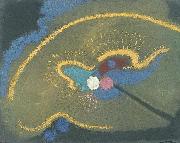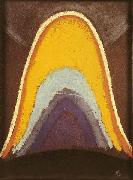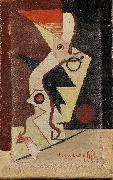Wholesale Oil Painting No Minimum |
|||||||||||
|
|
|||||||||||

|
|||||||||||
|
|
|
||||||||
Vassily KandinskyRussian-born French Expressionist Painter , 1866-1944 was a Russian painter, printmaker and art theorist. One of the most famous 20th-century artists, he is credited with painting the first modern abstract works. Born in Moscow, Kandinsky spent his childhood in Odessa. He enrolled at the University of Moscow and chose to study law and economics. Quite successful in his profession??he was offered a professorship (chair of Roman Law) at the University of Dorpat??he started painting studies (life-drawing, sketching and anatomy) at the age of 30. In 1896 he settled in Munich and studied first in the private school of Anton Azbe and then at the Academy of Fine Arts, Munich. He went back to Moscow in 1914 after World War I started. He was unsympathetic to the official theories on art in Moscow and returned to Germany in 1921. There he taught at the Bauhaus school of art and architecture from 1922 until the Nazis closed it in 1933. |
||||||||
|
|
||||||||
Composition
Composition Painting ID:: 29375 |
mk65
Oil on canvas
37x55"
mk65 Oil on canvas 37x55" |
|||||||
|
|
||||||||
Kazimir Malevich1878-1935 Russian painter, printmaker, decorative artist and writer of Ukranian birth. One of the pioneers of abstract art, Malevich was a central figure in a succession of avant-garde movements during the period of the Russian revolutions of 1905 and 1917 and immediately after. The style of severe geometric abstraction with which he is most closely associated, SUPREMATISM, was a leading force in the development of CONSTRUCTIVISM, the repercussions of which continued to be felt throughout the 20th century. His work was suppressed in Soviet Russia in the 1930s and remained little known during the following two decades. The reassessment of his reputation in the West from the mid-1950s was matched by the renewed influence of his work on the paintings of Ad Reinhardt and on developments |
||||||||
|
|
||||||||
|
|
composition
composition Painting ID:: 68762 |
1928-32 oil 40x56
se 1928-32 oil 40x56 se |
||||||
|
|
||||||||
Theo van DoesburgDutch 1883-1931 Dutch painter, architect, designer and writer. He was officially registered as the son of Wilhelm Kepper and Henrietta Catharina Margadant, but he was so convinced that his mother second husband, Theodorus Doesburg, was his father that he took his name. Little is known of his early life, but he began painting naturalistic subjects c. 1899. In 1903 he began his military service, and around the same time he met his first wife, Agnita Feis, a Theosophist and poet. Between about 1908 and 1910, much influenced by the work of Honor Daumier, he produced caricatures, some of which were later published in his first book De maskers af! (1916). Also during this period he painted some Impressionist-inspired landscapes and portraits in the manner of George Hendrik Breitner. Between 1914 and 1915 the influence of Kandinsky became clear in such drawings as Streetmusic I and Streetmusic II (The Hague, Rijksdienst Beeld. Kst) and other abstract works. |
||||||||
|
|
||||||||
|
|
Composition
Composition Painting ID:: 93014 |
Date 1915 (?)
Medium pastel on black paper
Dimensions 23.5 X 30 cm (9.3 X 11.8 in)
TTD Date 1915 (?) Medium pastel on black paper Dimensions 23.5 X 30 cm (9.3 X 11.8 in) TTD |
||||||
|
|
||||||||
Theo van DoesburgDutch 1883-1931 Dutch painter, architect, designer and writer. He was officially registered as the son of Wilhelm Kepper and Henrietta Catharina Margadant, but he was so convinced that his mother second husband, Theodorus Doesburg, was his father that he took his name. Little is known of his early life, but he began painting naturalistic subjects c. 1899. In 1903 he began his military service, and around the same time he met his first wife, Agnita Feis, a Theosophist and poet. Between about 1908 and 1910, much influenced by the work of Honor Daumier, he produced caricatures, some of which were later published in his first book De maskers af! (1916). Also during this period he painted some Impressionist-inspired landscapes and portraits in the manner of George Hendrik Breitner. Between 1914 and 1915 the influence of Kandinsky became clear in such drawings as Streetmusic I and Streetmusic II (The Hague, Rijksdienst Beeld. Kst) and other abstract works. |
||||||||
|
|
||||||||
|
|
Composition
Composition Painting ID:: 93019 |
Date 1915 (?)
Medium pastel on paper
Dimensions 32 X 24 cm (12.6 X 9.4 in)
TTD Date 1915 (?) Medium pastel on paper Dimensions 32 X 24 cm (12.6 X 9.4 in) TTD |
||||||
|
|
||||||||
louis marcoussisLouis Marcoussis, formerly Ludwik Kazimierz Wladyslaw Markus or Ludwig Casimir Ladislas Markus, (1878 or 1883, Warsaw -- October 22, 1941, Cusset) was a painter and engraver of Polish origin who lived in Paris for much of his life and became a French citizen. After studying law briefly in Warsaw he went to the Krakow Academy of Fine Arts, where his teachers included Jan Stanislawski and Jozev Mehoffer. Moving to Paris in 1903, he spent a short time at the Academie Julian under Jules Lefebvre. The first time a painting of his was shown in a major exhibition was at the Salon d'Automne in 1905, and over the next quarter-century his work was shown in many other important exhibitions, in particular at the Salon des Independants and the Tuileries. He drew cartoons for satirical journals, as he had earlier in Poland. In Paris he needed to earn his own living, and also took on other drawing and illustration work. In the cafes of Montmartre and Montparnasse he got to know Apollinaire, Braque, Degas, Picasso and many more artists and writers. It was Apollinaire who suggested Markus' French name, Marcoussis, after a village not far from Paris. Impressionism influenced his early paintings, but from about 1910 he was part of the Cubist movement alongside other avant-garde painters like Picasso, Braque and Juan Gris. His work was shown in exhibitions in many European cities and in the US. In 1925 he had his first solo exhibition in Paris. As well as painting still-lifes and musical instruments in the Cubist manner, he also produced portraits, views of Paris, and images from the Breton seaside. From 1930 onwards, he concentrated on printmaking and illustration, including work inspired by Apollinaire's Alcool, Tzara's Indicateur des chemins de cœur, and Éluard's Lingeres legeres and Aurelia. In the late 1930s Marcoussis collaborated with Spanish surrealist Joan Mire and taught him etching techniques. He also taught at the Academie Schlaefer. In 1913 he had married Alice Halicka, a painter who came from Krakow. Their daughter Malene was born in 1922. Marcoussis served in a Polish company of the French Foreign Legion from 1914-1919. He became a French citizen, while also staying in touch with Poland, both personally and professionally. He did not generally talk about his Jewish ancestry, and his family had converted to Catholicism, but today Marcoussis is often described as a Jewish artist. After Nazi troops arrived in Paris in 1940, Marcoussis and Alice moved to Cusset near Vichy. He died there on 22 October 1941 |
||||||||
|
|
||||||||
|
|
Composition
Composition Painting ID:: 96958 |
Oil on canvas, 10 x 7 cm
cyf Oil on canvas, 10 x 7 cm cyf |
||||||
|
|
||||||||
|
louis marcoussis Louis Marcoussis, formerly Ludwik Kazimierz Wladyslaw Markus or Ludwig Casimir Ladislas Markus, (1878 or 1883, Warsaw -- October 22, 1941, Cusset) was a painter and engraver of Polish origin who lived in Paris for much of his life and became a French citizen. After studying law briefly in Warsaw he went to the Krakow Academy of Fine Arts, where his teachers included Jan Stanislawski and Jozev Mehoffer. Moving to Paris in 1903, he spent a short time at the Academie Julian under Jules Lefebvre. The first time a painting of his was shown in a major exhibition was at the Salon d'Automne in 1905, and over the next quarter-century his work was shown in many other important exhibitions, in particular at the Salon des Independants and the Tuileries. He drew cartoons for satirical journals, as he had earlier in Poland. In Paris he needed to earn his own living, and also took on other drawing and illustration work. In the cafes of Montmartre and Montparnasse he got to know Apollinaire, Braque, Degas, Picasso and many more artists and writers. It was Apollinaire who suggested Markus' French name, Marcoussis, after a village not far from Paris. Impressionism influenced his early paintings, but from about 1910 he was part of the Cubist movement alongside other avant-garde painters like Picasso, Braque and Juan Gris. His work was shown in exhibitions in many European cities and in the US. In 1925 he had his first solo exhibition in Paris. As well as painting still-lifes and musical instruments in the Cubist manner, he also produced portraits, views of Paris, and images from the Breton seaside. From 1930 onwards, he concentrated on printmaking and illustration, including work inspired by Apollinaire's Alcool, Tzara's Indicateur des chemins de cœur, and Éluard's Lingeres legeres and Aurelia. In the late 1930s Marcoussis collaborated with Spanish surrealist Joan Mire and taught him etching techniques. He also taught at the Academie Schlaefer. In 1913 he had married Alice Halicka, a painter who came from Krakow. Their daughter Malene was born in 1922. Marcoussis served in a Polish company of the French Foreign Legion from 1914-1919. He became a French citizen, while also staying in touch with Poland, both personally and professionally. He did not generally talk about his Jewish ancestry, and his family had converted to Catholicism, but today Marcoussis is often described as a Jewish artist. After Nazi troops arrived in Paris in 1940, Marcoussis and Alice moved to Cusset near Vichy. He died there on 22 October 1941 Composition Oil on canvas, 10 x 7 cm cyf |
||||||||
|
|
||||||||
|
Prev Next
|
||||||||
|
|
||||||||
|
Related Paintings to louis marcoussis :. |
||||||||
|
|
||||||||
|
CONTACT US |
